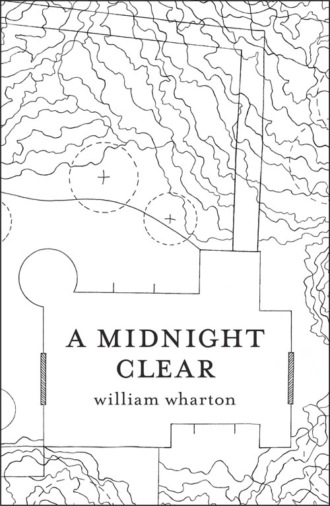
Полная версия
A Midnight Clear

WILLIAM WHARTON
A Midnight Clear

To those ASTPRers who never
Reached majority
… We need you now.
FEAR
I gasp in the still of one breath;
A wisp of bird feathers burning,
The smell of death in a flower.
Nothing to see and nothing to say;
Afraid to look, I can’t turn away;
My blink of emptiness pearling gray.
I watch myself watching me watching me.
The names in this
wintry Christmas tale
have been changed to
protect the guilty …
—W.W.
Table of Contents
Title Page
Dedication
Epigraph
1 Briefing
2 The Longest Night
3 Foo Kit Lur
4 Throw Me a Why Not
5 Don’t Tell Mother
6 A Statement of Charges
Also by William Wharton
Copyright
About the Publisher
1
Briefing
‘Holy God, Mother! What’s the matter?’
He pushes me back hard against my shelter half. He struggles, elbows, presses himself to his feet, boots sinking ankle deep in mud and melted snow at the bottom of our dent. He stands there, looming over me, staggering, slipping, not saying anything; staring into the sky.
Then he unslings his M1, grabs it in his right hand, arches his lean body into a tight spring and tosses that rifle, like a javelin, out of our hole, in a long, twisting arc at least a hundred feet downhill. He throws so hard his metal-rimmed GI glasses fly off his face, bounce against my chest and slide slowly into mud and water. They’re going to get smashed for sure.
He doesn’t look at me. Without his glasses, Mother’s face seems empty; he probably couldn’t see me anyhow, even if he did look.
We’ve been squatting in what could be a leftover one-man trench from World War I, but is probably only a root hole from a rotted, blown-down tree.
Over the past two and a half hours we haven’t said much. We’re on for four. Sometimes I think Mother might be crying but I don’t look; I’m so close to it myself, I don’t want to start anything. Mother’s scrambling now, rifleless, up onto the edge of our hole. He’s pulling at his webbing equipment, trying to unhook it.
Normally, the band would be standing this perimeter guard, but they’re in town with the officers entertaining Red Cross ladies. The Red Cross battled its way up to our regiment yesterday and sold us doughnuts, ten cents apiece, two lines, enlisted men and officers. I didn’t peek to see if officers paid. I bought one and shat it half an hour later.
Squatting there with Mother, I’d been watching one of those little buzzing L5 artillery observation planes circling over us. The motor has a peaceful sound like an airplane on a summer day at the shore dragging an advertisement saying
PEPSI – COLA
in the sky. Only now it’s winter and it isn’t peaceful.
I lean down, carefully pick up Mother’s glasses, then shove myself off from the bottom of our hole, pushing against my muddy shelter half. The frame’s twisted but nothing’s broken; the lenses are thick as milk-bottle bottoms; they’d be hard to break. But they’re slippery, gritty, wet and smeared with mud.
Mother’s up on the lip of the hole. Now he’s crying hard but isn’t making much noise. I start scrabbling my way out; I want to pull him back down before someone sees us.
We’re on the side of a hill at the edge of a forest. In fact, we’re surrounded by hilly forests. It’s snowed a few times but green’s showing through today and mostly everything’s either thin hard-crusted snow or mud. I know it’s somewhere around mid-December, but that’s about all. Even though we’re in reserve here, for some reason neither mail nor Stars & Stripes has been getting through.
Now Mother takes off. He’s gotten himself unhooked and slings his ammo belt, his pack, entrenching tool, bayonet, canteen; the whole kit and caboodle, looping, twisting through the air, downhill. Just before he disappears into the trees, he flips his helmet, discus-style, off in the direction of his rifle. He acts as if he really is quitting the war!
I’m torn between running after him and not deserting the post. After all, I am sergeant of the guard; can you believe that? I don’t.
First, I run down to get the rifle, helmet and webbing equipment. Then I run after Mother, picking up his things as I go. When I reach down to snatch up his field jacket, I peer back; nobody’s watching. Everybody with any sense is sleeping, taking advantage of all those missing officers. I know both Ware, that’s our platoon leader, and Major Love, our S2, are off playing ‘hero’ for the ladies. We still don’t have a new platoon sergeant, either.
I prop my rifle against the first tree, with Mother’s things, and run after him. He’s speeding like the wind, not looking back. Without his glasses he’s liable to smash into a tree. There’s no use hollering, so I squeeze tight and keep on. Who knows, maybe he’ll run us both right on out of the war, through division, corps, army, the whole rear guard. Maybe we’ll find a French family with a lovely daughter and they’ll hide us. If we get caught, I can always say I was only trying to catch Mother, trying to salvage government equipment, picking up Mother’s clothes.
The trouble is we’re going the wrong way. He’s headed south; all we’ll do is run into the perimeter guard for some other tired, mixed-up regiment. We’re all so scared we’ll shoot at anything, especially some bare-assed, bare-eyed skeleton in boots.
From what I’ve scooped up so far, Mother is down to boots and socks. I almost caught him while he pulled off his pants, but when I stopped to pick them up, he scooted away again. We’re playing a unique version of Hänsel and Gretel with strip poker overtones; or maybe something of Atalanta’s race.
Because of the exertion, I’m having my usual problem; the stomach’s turning upside down; soundless, burning squirts are slipping out. I’ll smell like a portable latrine when I catch up with Mother. Big headlines: POISON GAS USED IN ARDENNES!
Mother’s definitely outdistancing me. I determine to grit it hard for another burst of two hundred yards, then I’ll have to give up. Christ, what’ll I tell Ware?
The next time I look, I don’t see Mother anywhere. We’re still in forest but we’ve gone down a steep hill. Then I spot him. He’s flopped into a streambed and is digging in it, throwing rocks left and right like a dog searching a bone. I slow down, stunned, and stop, staring, while I catch my breath.
I start moving slowly downhill toward him, wondering what’s next. What happens now? What sergeant-like thing am I supposed to do? I’m sliding and slipping on a combination of iced snow and pine needles. My entire body’s shaking. These days, I’m so shaky most of the time I need to wait for a good quiet moment to draw or even write a letter. I’ve taken to printing in capital letters, short quick strokes; not much chance for a wild, erratic, uncontrolled twitch to give me away.
I squat at the edge of the stream beside Mother. That water’s got to be ice cold but he’s kneeling in it on naked, white legs. I know I’m thin, what with my GIs and all, but Mother’s so skinny it’s hard to believe he’s even alive.
I stay there quietly, watching him toss stones, concentrating between his knees. I’ve got to do something.
‘Here, Mother, I have your glasses. You forgot them up there in our dent.’
He turns and stares blankly at me, stops digging, kneeling in that fast-running, cold, clear stream. I hold the glasses out. Slowly he crawls toward me, takes hold and slips the glasses across his eyes, carefully hooking behind his ears. He’d stopped crying but now he starts again. I help pull him out of the creek and we don’t say anything. I can’t think of a single word I can possibly say to make any sense and I’m not sure Mother could talk if he wanted to.
Piece by piece, I hand him his clothes and he puts them on. He dresses slowly, taking deep breaths, as if he’s in a barracks on a Sunday morning. His boots and socks are soaking wet, but after he buttons his field jacket, he looks almost normal; except for his blue-white face and the crying.
‘Mother, I’ve got your rifle, helmet and webbing stuff back there at the edge of the forest. How are you feeling?’
Mother looks into my eyes for the first time since he started running. Snot and tears are smeared across his face. God, it’s so weird seeing our Mother Wilkins like this.
We call him Mother Hen Wilkins because he’s always hounding us for being sloppy, bugging us about leaving things around or not cleaning out mess kits and canteen cups. Once Fred Brandt complained how Wilkins would sneak up on everyone after breakfast and give the sniff test to see if we’d brushed our teeth.
Mother’s one of the oldest in our squad and he’s married. He had his twenty-sixth birthday two days before his baby was born dead. Mundy told me that. Some birthday present!
Mother’s still staring at me through his fogged-up glasses. He’s leaning slightly forward with his arms dangling in front of him, a puppet waiting to be used. He starts talking in his slow, careful way, thinking out each word, every phrase, sentence, as if it’s going to be engraved on platinum.
‘You know, Wont, I don’t know if I have combat fatigue or not. One whole part of me knows everything I just did, from tossing my M1 to scratching in this frozen creek. One part of me knew and wanted to stop, but another part kept going, wanted to keep running, throwing off things, doing any kind of crazy business it could think of. That part was definitely bucking for Section Eight. That part, the deepest inside part of me, will do anything to get out of all this and go home with Linda.’
‘Want me to turn you in, Vance? I could write up the most beautiful Section Eight certification evidence anybody ever heard of. Between the actual wild things you just did and the stuff I’d make up, you’d at least get back to some psychiatrist in a hospital.’
Mother lowers himself cross-legged onto the ground. He props his head in his frozen hands, his elbows on his knees. He’s thinking about it all right.
‘No, I’d never make it. I’m still not scared enough. I’m too scared of them and not scared enough of myself. I couldn’t fool anybody. Part of what let me go through all this shit was it was only you there and it didn’t really count.’
‘You sure fooled me, Mother; I’ll tell you that. You also broke a squad rule.’
He lifts his head off his hands, straightens up.
‘What rule? What squad rule did I break?’
‘You said “shit.” What would Father say? Don’t let them get to you, Mother. No matter what happens, don’t let them get you.’
There are many peculiar things about our squad. I’ll start out with a few. First, we almost never call the Germans KRAUT or JERRY or HUN or NAZIS, any of the usual army names. At the most, they’re ‘the enemy.’ Only Stan Shutzer, our professional Jew, calls them anything he wants. Father Paul Mundy gave him a special dispensation. Yes, we have a squad father, too; Mother Wilkins, Father Mundy. But that isn’t the second squad’s second peculiarity, it’s only an accident.
Father Mundy invented our squad ‘no obscenity’ rule. We want to make it clear we are not actually part of this army. We’re princely orphans left on the wrong doorstep, maybe bastards of the blood. It helps. This might well be one of Father’s greatest coups. For a guy who acts so dumb sometimes, he can be shrewd. Mundy’s twenty-six, a dropout – but not fallen – almost priest. He and Mother are the old men in the squad now, the rest of us are under twenty.
We pick up our equipment at the edge of the forest and are back in our dirt dent before the next guard comes on. Mother’s got himself fairly well in hand. It’ll be Bud Miller, our mechanical genius, crossword-puzzle inventor and child poet, along with Stan Shutzer, Jewish avenger and aspiring millionaire advertising executive. Both Bud and Stan have jewelers for fathers, but I think it’s about the only thing they have in common, except being smart and at the same time dumb enough to be in an infantry I and R squad. They’re on the next four, from two to six. Edwards’s squad’s got the night part but then there’re twelve of them so they can keep it two hours each, and it shouldn’t be bad. After the ball is over, the musicians will take their usual guard duty again.
Mother and I straggle back to our bivouac. He and I are tenting together now. Before the Saar, he was with Jim Freize. Jim was definitely a close second to Mother in the neatness competition. They’d fuss around getting their area cleaned up, everything neatly packed away; then they’d meander down to the motor pool to wipe and shine their jeep. Neither of them knew the first thing about how to keep a jeep running, but theirs was always spic and span, even in the damned Metz mud. Miller, the mad mechanic, won’t let the motor pool jocks near any of our squad jeeps, but he’d only laugh at Jim and Mother puttering around.
I crawl into my sloppy side of our tent and pull out the book we’re reading right now. It’s called A Farewell to Arms. I have pages 215 to 310. Wilkins is ahead of me and Shutzer behind. Shutzer’s been hounding me all day to hurry it up; Wilkins finished last night. It’s just my luck being caught between two of the fastest readers on our side of the Siegfried Line. We rip books apart so we can read them together.
The book before this was All Quiet on the Western Front. We talked it over and voted as a squad to quit the war first chance we got. We were still together then, outside Saarbrücken. Father Mundy didn’t realize, until we told him, the characters in the book were German. But he might have gotten skipped over with some pages. We usually leave Father until last; he reads each word as if he’s licking it.
I finish my pages and put them at the opening of our tent for Shutzer.
This chapter is called briefing. There is a typical military briefing coming up soon but I think I should give our real briefing here while I’m supposed to be drifting off to sleep.
Briefing, in the army, means explaining. The army mind wants everything short and simple, except wars. Maybe that’s why they call it briefing. But sometimes it’s hard to be short and simple. Probably, in a certain way, this whole book, not just this chapter, is a briefing; but I’m not quite sure for or about what.
Our squad is half of the I and R platoon, the second half. The I is for intelligence, the R for reconnaissance. The I and R platoon is part of the regimental headquarters company of the Umpty-eleventh Regiment, of the Eighty-tenth Infantry Division. A regimental headquarters company is basically a lot of nothing.
To give an idea. We have a bird colonel, his adjutant and assistant; all and each with orderlies. There’s the S1, S2, S3, S4, S5, and so on, each a major, each with an assistant, all with orderlies. An orderly in the army is a low-paid military servant.
Then, we have cooks, cooks’ helpers, cooks’ assistants, permanent KPs, supply clerks, mail clerks, file clerks, typists, messengers; a plethora of personnel people, plus the motor pool crowd. The motor pool is where they park the vehicles, almost exclusively jeeps, staff cars or two-and-a-half-ton trucks; nothing very warlike. Actually these vehicles mostly only carry people and their junk from one place to another. The drivers of this hauling fleet are T4s and T5s; that is, sergeants and corporals who aren’t expected to shoot anybody on purpose.
We’ve also got the regimental band: thirty of the most unlikely soldiers to be found on the wrong side of division. As I said, they usually stand perimeter guard for the company. I’ve never heard them play, but then there haven’t been many parades. We liberated a violin at Rouen and Mel Gordon wanted a tryout but was told there’s no room for violins in a military band. But wouldn’t it be great, hearing taps or reveille – better yet, retreat – played on a violin?
Last and least comes the I and R platoon. There are twelve in a squad; squad leader’s buck sergeant, assistant corporal; no orderlies. Our squad is down to six. Mel Gordon became corporal to our squad the same time I made sergeant. It wasn’t for much we did except stay alive. He hasn’t sewn on his stripes yet, either.
I and R is the eyes and ears for S2. S2 is regimental intelligence. Our S2 is Major Love, both name and job gruesomely inappropriate. Love was a mortician in civilian life. He’s ‘eyes and ears’ to Colonel Douglas Sugger, regimental commander, usually referred to as ‘the Dug Sucker.’ The Dug’s a past master at war costumes and heroic jaw thrusting. Major Love has a slight talent for jaw thrusting, too.
Love’s main passion is generating business for his professional colleagues, the grave registrars. His most available target has been the I and R platoon, with which he has had some sporadic but notable success. Whistle Tompkins always claimed that any living, moving human body was an insult to Love’s sense of propriety.
It’s thanks to Love and his military-mortuary skills I’ve made my recent headlong leap to three stripes. We lost half our squad in the Saar, attempting one of his map-inspired, ill-conceived, so-called ‘recon’ patrols. You can’t imagine how meaningless and stupid this was. It’s so bad I won’t tell about it; I hope.
When I say lost, I mean killed. Nobody in the army ever admits someone on our side is killed. They’re either lost, like Christopher Robin; hit, as in batter hit by a pitched ball, take your base, or they get ‘it,’ as in hide-and-seek, or, maybe, ‘get it,’ as with an ambiguous joke.
Our squad leader was Max Lewis, twenty. His assistant, Louis Corrollo, nineteen. We called them ‘the Louie [like Louie, Louie, You Gotta Go] twins.’ The other four of us who got ‘it’ that day were Morrie Margolis, Whistle Tompkins, Fred Brandt and Jim Freize.
Morrie was my tentmate. We shared shelter halfs, buttoned them together to make a pup tent, shared other things, too. Not one of those six had an AGCT (AGCT is another inbuilt military paradox, an army intelligence test) score of under 150; each, intellectually, one in ten thousand. But that’s all another story, a story even more stupid than Love’s patrol. I’m liable to tell that one.
I have a penchant for telling true stories no one can believe.
My being squad leader is also another story. It’s another story the way Peter Rabbit is another story from Crime and Punishment.
Our division took a mauling outside Saarbrücken. We gained a few miles of European real estate and lost the beginnings to untolled (much more than untold) generations of very bright people. I think the U.S. Army considered this a good deal.
So now we’ve been moved north into the Ardennes Forest to rest and wait replacements. This is supposed to be a sector where nothing’s ever happened and nothing is ever going to happen, a kind of high-class halfway house; a front-line position for adjusting makeup, straightening out nerves and general refurbishing.
I’m not sure if I myself am recuperable. I’m scared all the time and can’t sleep, not even on a long guard. I’ve already had two crying fits but nobody saw me and I gave them every chance. I hung around Mel Gordon, our unofficial squad doctor and psychiatrist, moaning, but he didn’t even notice. Nobody wants to look.
My biggest immediate trouble is an absolutely historic case of GIs. Thank God for olive drab underwear.
The medics here have marked me down as a paregoric addict and won’t give me any more. Yesterday I walked to my old company, Company L, and begged two doses from Brenner, third platoon medic.
I shat five times going and only three coming back so it must’ve helped. I’m eating K ration biscuits and K lunch cheese almost exclusively; but I’m too gut scared for processing food. Making me squad (try squat) leader might be one of the greatest impractical jokes of the war.
With this jolly thought, I end our briefing and drift off into what passes for sleep these days; Mother is snoring beside me.
In the morning, Lieutenant Ware pulls open our tent flap; the pages are gone; Shutzer got them, I hope.
‘Sergeant Knott, Major Love wants us at the S2 tent. You chow up, then I’ll come by at o-nine-hundred.’
He waits to make sure I’m awake, then he’s gone. I lie back and try to think of some appropriate non-obscene word to express my feelings. I’m not awake enough. ‘Shit!’ is all that comes. Father says we are succumbing internally if we think in their terms. I admit it; inside, I’ve succumbed. Maybe that’s why they made me squad leader. Maybe that’s why I have the GIs, too; I’m polluted.
But it’s better this morning. I can even lean over to lace my boots without feeling I’m squeezing a balloon filled with sewer water in my stomach.
While I’m getting dressed, wriggling in a pup tent, trying not to wake Wilkins, I should explain something about my name; more briefing. Our family name is Knott. My parents wanted to call me Bill or Billy, but because there’s no Saint Bill or Billy, I was named William. They insist no joke was intended.
By third grade at school, I was Will Knott. I learned to live with it, my private martyrdom. So I was more or less prepared to grit it out again in the army, Willingly or Knott (Ha!). What I wasn’t ready for was the conglomeration of certified wise guys and punsters called the I and R platoon. They decided my nickname must be Wont or Won’t; only the spelling was contended.
All through basic, the controversy raged. Max Lewis was leader of the apostrophe group, claiming I’m a natural radical, troublemaker and guardhouse lawyer who Won’t do anything I’m told. Mel Gordon headed the no-apostrophe crowd, insisting I’m too nice, and Wont to do anything I’m asked.
They called themselves ‘the apostates’ and ‘the antiapostates.’ Father Mundy says it’s all in the mind of the beholder.
So everybody calls me Won’t or Wont and it’s up to me. That is, all except Max, who called me W-O-N-apostrophe-T right up till he got IT.
I’m dressed now and sliding out of the tent, mess kit and cup in hand. I see Mother Wilkins has cleaned out the bottom of my cup again. I wonder what he leaves for his wife to do at home?
I mention all the above nonsense about my name to give some idea of the wheel spinning that can go on when you have too much brain power concentrated in too small a place. Our squad has one hell of a lot of intelligence but not much reconnaissance. We’re a covey of nit-picking Talmudic Jesuit Sophists continuously elaborating one unending bead game.
I decide to take the big risk and eat some regular, scrambled hot eggs and one sausage. I know better than to try coffee. Coffee works like castor oil on me. I’m not sure if it’s coffee itself or all the coffee I’ve drunk scared; but the smell, the taste, the feel of coffee makes me jumpy, shattery, scared shitless, to be precise. It still does today.
I take my mess kit and climb into one of the communications trucks, slink down and try to eat carefully, quietly, in peace, chewing each mouthful twenty times and swallowing slowly.
I’m almost finished when Lieutenant Ware finds me. He’s standing looking over the tailgate, his helmet pushed back on his head. He’s Van Heflin playing Van Johnson in a war movie with Marlene Dietrich as the Nazi spy.
A word here about Ware while I’m trying to get down the last two forkfuls and mediating my stomach into some kind of operational order.







